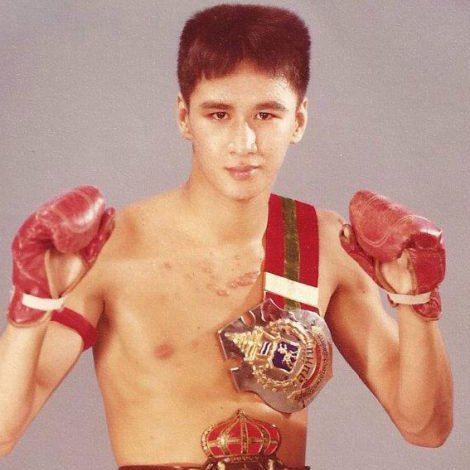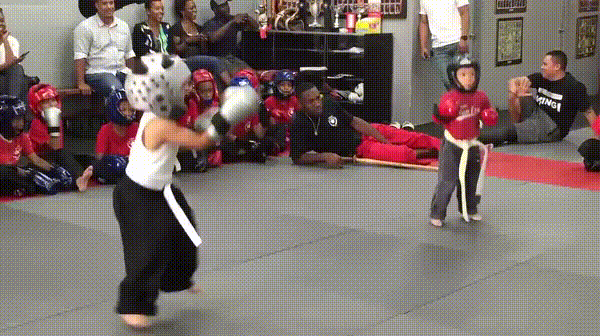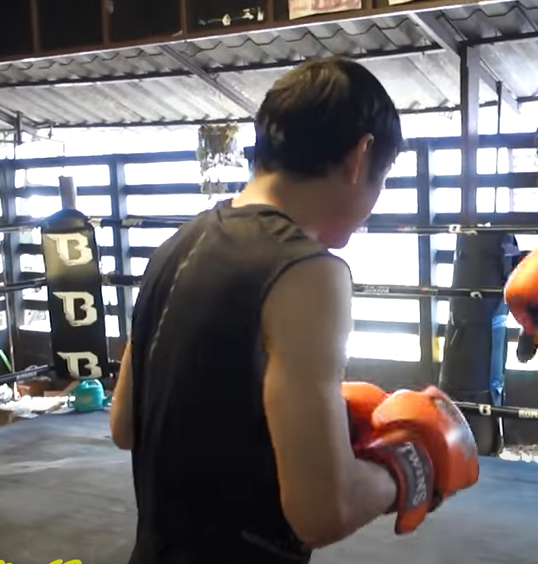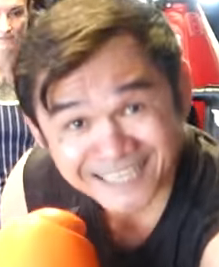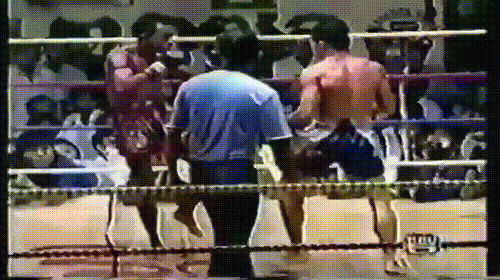-
Posts
12 -
Joined
-
Last visited
-
Days Won
2
Tyler from Florida last won the day on December 14 2021
Tyler from Florida had the most liked content!
About Tyler from Florida
- Birthday August 26
Contact Methods
-
Website URL
https://twitter.com/phytotyler
Profile Information
-
Gender
Male
-
Location
Florida, USA
-
Interests
Literature, visual arts, plants, and muay Thai!
Recent Profile Visitors
The recent visitors block is disabled and is not being shown to other users.
Tyler from Florida's Achievements
-
I often see the criticism repeated that nak muay have "bad" footwork, "no hands", and a "lack" of head movement, especially compared to western boxing. What are your thoughts on this? Personally I think people who repeat the sentiment just don't watch a lot of stadium muay Thai and are only referencing what they know from being taught in their western muay Thai gyms, and I think people who say that despite watching a lot of muay Thai just don't know what they're watching. Obviously moving your head is going to be different in muay Thai than it is in boxing, because of kicks and knees and in-fighting is going to be much different because of the clinch and elbows. I don't think that means it's "worse", it's just different. I still see tons of slipping in muay Thai, tons of angling off and tons of lateral movement when they have room for it. People try to analyze muay Thai through the lens of boxing and don't consider or don't care that boxers only have to worry about two things: the left hand and the right hand. Naturally that's going to allow you much more freedom to move out of the way of attacks. If anything, to me that makes the head movement in muay Thai that much more impressive and the subtlety is lost on a lot of people. You're not afforded massive drastic slips and bobs because you'll be punished for it. As far as the criticism of footwork goes, I think it's again people trying to analyze muay Thai through a boxing lens because the footwork in muay Thai is definitely not bad or worse imo. There's tons of stance-switching, angling, attacking while moving, etc. Again the movements are much more drastic in boxing because they're allowed to be, and in muay Thai it's more opportunistic. Furthermore a lot of it is stylistic and matchup dependent. There are gyms that produce punchers, gyms that produce kickers, gyms that produce knee fighters etc. If you're watching two knee fighters clinch each other, of course there's going to be fewer boxing exchanges and less head movement as they work forward towards a clinch. On the other hand I don't know how someone could watch any of the old Jocky Gym fighters for example and say they have bad footwork or movement. Same goes for the boxing, it's not emphasized in muay Thai scoring so people think they're bad at it. But then you watch fighters like Veeraphol, Lakhin, Toto, Somrak, Samart, Wangchannoi, Boonlai, etc and they have excellent hands. Some of them even transitioned to western boxing and did extremely well. What do you think? Am I overestimating the abilities of nak muay or are people who share the criticisms underestimating and misunderstanding the sport? I don't think it's fair to compare footwork and head movement in a sport like boxing to something like muay Thai where it's simply not viable to fight the same way. Does the different ruleset mean nak muay are worse, or just different? I think if they were worse or "bad" there wouldn't be so many nak muay who transition to western boxing and still perform at high levels. Thoughts?
-
Yeah sorry to kind of skirt the initial topic a bit haha. Apologies Your wood analogy is amazing to me actually. Highlights the difference between the natural evolution of the sport versus the "overgrowing" of it by way of an 'invasive' species in the bullheaded tendencies of foreign ideas of fighting. Very succinct. I think Thailand's close relationship with muay Thai as an economic end puts it in a different place than a lot of other martial arts; muay Thai is the national sport of Thailand, and it's a large part of the attraction for tourists. I feel this puts more pressure on the sport to "modernize" itself and invite other 'species' into the forest so to speak, both from governmental figures and from civilian viewpoints. The economic motivation to westernize and fight aggressively is at odds with the traditional spirit of dominating the fight space in your way. There are not a lot of places here in the west where boxing is seen as a career choice. Fighting as a career is generally thought of as something reserved for 'talented' folk, 'gifted athletes' and 'born fighters'. If you're an average fighter, people would tell you it's smarter to get a real job for less CTE and keep it as a hobby. Only the most passionate continue regardless, and monetarily successful boxers often owe their success to what they do outside of the ring as much as inside it. Boxers can get away with being less-appealing in their approach to fighting when it's simply a hobby or when they can charm the public outside of the ring. In Thailand by contrast, fighters are often born into it. Kids fight as a source of income. Gym owners often raise these fighters under the impression that there will be a return on the investment. For many, it's not just a side-gig, it's dinner. So with the proliferation of these ONE and MAX style promotions and the massive star-appeal of fighters like Rodtang with their "never step backwards" approach it's clear there's incentive to westernize. I guess the question is what is the lineation between muay Thai 'evolving' and muay Thai being 'overgrown', and it seems this is where people tend to disagree. Encouraging more Rodtangs is great, everyone loves a Rodtang. But what happens when there's no room left for the others? Removing rounds and punishing fighters for 'non-engagement' is a slippery slope when avoiding engagement is a valid way to dominate the ring, traditionally. It only makes it that much more important to preserve the legacy or else it runs the risk of becoming an entirely different forest before long. In this way maybe the MTL could be seen as a sort of seedbank.
-
Absolutely 100% agree with that. Like I said, I think changing the way the muay Thai works fundamentally is putting the cart before the horse, and like you said muay Thai isn't going to appeal to the majority. Combat sports themselves are niche to begin with. I'm not a marketing expert, far from it, but I think if they really wanted to capture the western audience they would do better to not bother trying to "westernize" the fights themselves and instead westernize the way the fights are served to us. Muay Thai is already high-level and there's plenty there to marvel at without forcing the fighters to run at each other like it's a game of Red Rover. Understandably, it's a lot tougher because of the way Thai gyms work, and the fact that there's multiple stadiums presenting fights from multiple different promoters. But man, if there were some central organization actively working to show us these fights with English text and transliteration for the names, in a centralized location or at least a centralized directory, I think it would go far in terms of western outreach. I mean just look at how many people you and Sylvie reach on your corner of the internet. You guys often function as a lifeline for English speakers into the world of Thailand's muay Thai. Imagine if there were an organization dedicated to purely describing, promoting and informing people about upcoming muay Thai events in a way that westerners are used to. To touch on western boxing again, I often hear people complain that the multitude of promoters and organizations is annoying to keep up with, and that's stuff that's easily available to us. Now imagine it's all in Thai and you can't even make out the names of the fighters Again, with the way muay Thai functions in Thailand with its plethora of gyms, stadiums and promoters it would definitely be much more of a logistical hurdle. And I know these types of things cost money to do. Maybe it couldn't be done, maybe it could. I don't know! Either way I'm interested in seeing how this all develops further, and I hope the stadiums find a reasonable solution that maintains the integrity of traditional muay Thai.
-
Of course there are fighters who can transcend the general taste for forward hulk-smashing but I think they're the exception, definitely not the rule. It takes people who are borderline one-of-a-kind. Boxing has been on the decline in terms of popularity, at least before the YouTuber boom. All of the fighters you mentioned are dead or retired with the exception of Loma who up until recently was considered a boxer's boxer because he was so technical. And BJJ, sure it exploded in popularity at some point, but not without the help of a massive marketing campaign from the family that invented it. Of course UFC fans like it, the UFC was created as an advertisement for it, and still the live crowds actively boo fighters sometimes when they're on the ground. Maybe muay Thai needs a Gracie family lol. I don't disagree there's a decent portion of combat sport enthusiasts who appreciate the more technical aspects but I do think they're a minority in the grand scheme. I think a lot of people who appreciate those parts are martial artists themselves. Lots of people only care about technique insofar as it leads to knockouts or submissions, or they need someone so blatantly talented as a Floyd Mayweather or Ray Robinson to beat them over the head with their skill. It's not alien, it's just not what's in favor anymore in my opinion and it's the majority audience everyone's trying to capture because that's where the money's at.
-
Completely agree with Joseph there, definitely make a habit of recording yourself. Sometimes something will feel right, but it only feels like that because it's comfortable, not 'correct', and watching yourself do it can make your mistakes very apparent. Sometimes proper form only becomes comfortable after you've trained it into your body. Try to imagine you're critiquing someone else instead of watching a video of yourself, so you can be as objective as possible. There's a reason a lot of gyms have those floor-to-ceiling mirrors in them. If you look goofy it's for a reason, and traditional muay Thai puts a lot of emphasis on aesthetically 'beautiful' technique and balance, not just 'getting the job done'. If you have proper technique you're going to get the job done, that's the point of having proper form in the first place. If it feels right AND looks right, it probably is right. Also I think just focusing on conditioning and fitness is a great way to become a better fighter without fighting. Maybe the only way to become a better fighter without actually fighting lol. Nobody was ever a worse fighter because they got more fit. You don't really need a plethora of complex technique and strategy to be an efficient fighter, you can win a fight with the basics, so without access to someone who can easily and efficiently correct your mistakes and if you don't trust yourself enough to be that person, then skipping more rope, kicking more bags, doing more pull-ups, running more miles etc. will definitely get you some mileage towards becoming a better fighter versus any potential opponent as opposed to learning new setups or advanced techniques that maybe need a deeper understanding and fire testing to grasp. Since you said you do luckily have access to sparring, if I were you I would focus mostly on conditioning and fitness in my free time and maybe a day or two before a sparring session do a little studying and practicing of new technique and strategy so I have something to try in my sparring session. Like 70% fitness, 30% knowledge-getting. Watch your favorites from the MTL and try to incorporate some of that into your session, see what works for you and what doesn't. Then when you get home you can practice the stuff that you now know works for you and become even better at it. That's the whole purpose of sparring in the first place, it's a learning experience. Hopefully your sparring partners are the type that are trying to learn and not trying to take your head off :P. Imo you'll never plateau as long as you stay interested enough to train and learn, there's always room for improvement.
-
Right, so not-losing and saving the gamblers is as important or more important than just their fight purse. Hard to reconcile that then. What's your take on the Omnoi stadium solution in that case? In the case they get docked but don't get thrown out, they'd still be losing their gambler's money too right? I would hope the purse-docking only applies to the fighter who refuses to chase his opponent and not the fighter who fights backwards, but it would probably apply to both if the idea is a westernization and to incentivize a clashing of heads, which would be massively unfortunate.
-
I think a large part of the problem is westerners just don't really know about Thai boxing. Many people over here tune into muay Thai fights with no knowledge of combat sports outside of boxing and MMA. This is the lens through which they're trying to watch muay Thai, when muay Thai isn't watchable like that. Like you say, many westerners conceptualize a fight as pure forward aggression. I would say the majority of westerners, outside of the ones passionate about martial arts, view fights this way. They don't understand the ruleset or the spirit of muay Thai. Just as many don't even care about the spirit, they just want to see people smashing each other's heads. To be an "eloquent" fighter is almost always met with dissent, it takes someone of a caliber and influence like Floyd Mayweather to gain acceptance as that type of fighter, and even now many people only begrudgingly admit his greatness and just as many insist he only "ran away" in his fights. As an anecdote, I frequent some MMA communities and one of my favorite fighters right now is Ciryl Gane. Many people complain that Ciryl is boring, and complain that despite being a 6'4, 260lb heavyweight he has no knockouts in his 10 bouts. Even Dana White himself has criticized Ciryl for being 'boring'. Funny enough, Ciryl's background in combat starts with muay Thai. He has a big ol Sak Yant tattoo on the center of his chest. Ciryl has never even lost a round in the UFC and was undefeated in his muay Thai career, yet this is considered boring to the average UFC fan and even the figurative head of the organization. I especially love this description of muay Thai. Brevity is the soul of wit and this one sentence here sums up everything muay Thai to me, specifically "dominance over the fight space and much less about sheer displays of aggression". If more people could approach muay Thai under the impression that it's about dominating the fight space and not just smashing each other's skull in I think there would be a much greater appreciation of the sport here in the west. It's not a difficult concept to grasp, it's just one that combat sport fans here don't typically consider. Smashing skulls is just one way of dominating a fight space. I think muay Thai's traditional lack of appeal to westerners comes from a fundamental ignorance of it. I'm not really sure how you reconcile that though. Western fight fans are only becoming more inclined to sheer violence in my opinion, and less likely to go out of their way to learn or appreciate intricacies of another combat sport. There's also the issue of recognition. Many western fight-fans are less fans of the sport and more fans of the personalities. They don't particularly care about how good of a fighter Conor McGregor or Sean O'Malley really is, they just like the guys and will watch them no matter what, and when they watch a muay Thai event all they see is "that skinny asian guy" x10. That's a separate topic, but it ties into what I think the root of the problem is when we return to the ignorance of the traditional muay Thai spirit: lack of coverage. There's simply a massive lack of educators in terms of muay Thai. Even the people that do expose muay Thai and its intricacies to the west, like the various martial arts YouTube channels, typically cover golden-age legends as opposed to active fighters, and while they do a great job at highlighting their fighting prowess they don't often give that prowess its context within the sport. It's almost kind of funny to me because MMA fans tend to recognize muay Thai as being "the best striking base for MMA" and many love to preach to would-be martial artists that they should take MT classes to learn striking, yet not as many of them preach the same love for its culture and actual THAI FIGHTERS which is in itself inseparable from traditional muay Thai. Like on the muay Thai subreddit, when people are asking for advice and for fighters to watch to learn muay Thai, I always see westerners and UFC fighters being recommended or only the most famous of the Thai as if a beginner is going to be able to learn anything from watching Saenchai of all people or as if they aren't already familiar with someone of that caliber. It's always only the same few passionate people you see that are giving substantial and educated recommendations across Twitter, Reddit, and various forums, and these people can only be stretched so thin on their own. I think the rest of the passionate people don't even bother coming online to discuss the sport and keep it to their gym and real-life cohorts because the general lack of education on the topic can be frustrating and not everyone is even interested in teaching in the first place. It's hard even as a passionate fan to keep up with the current fighters, especially as someone who doesn't speak or read Thai. I rely entirely on various Twitter and Facebook pages to keep me updated sometimes. If it weren't for you and Sylvie, I'd be as ignorant as anyone else on many aspects of Thailand's muay Thai. It almost feels like Thailand's stadiums and promoters want the western audience and its money without having to interact with the west and its culture (understandable sometimes :P). They're willing to change the way muay Thai fighting works fundamentally to draw in viewers but don't want to change its "political" structure, if you will. It's not just the way the Thai fight that puts off the western audience (because even the more femeu style fights have plenty of display of "dog-ness" and aggression. you can't win a fight without fighting, afterall), it's the lack of structure. That is in my opinion a large reason ONE's muay Thai fights are popular, it's easy to follow the fighters. Not only did they westernize the ruleset, they also westernized the way they serve the ruleset. Its advertising and promoting is very UFC-styled. Everything looks familiar to a westerner even if the fighters are just "skinny asians" as I've heard put by the more meaty-headed of my fellow westerners. I mean, Channel 7 muay Thai is some of the best muay Thai around and if I want to watch it I have to buy a VPN. Changing the rules instead of changing the coverage to me is putting the cart before the horse and isn't going to solve anything in terms of western engagement, at least in my opinion. edit: I initially wrote putting the horse before the cart, which is the proper way to do it lmao. Oops
-
Well wouldn't the idea be that if you get thrown out you don't get your purse? Figure getting paid should be enough incentive, yeah? Or is not-losing worth more than their potential purse for losing? Maybe gamblers giving the fighter some of the money they bet on him for saving their bet? I do see Sylvie mentioned it's not entirely known how it affects their pay... I just assume the reason most of these guys are fighting in the first place is because they're getting paid. If getting thrown out = less pay, that defeats the entire point of fighting. Is saving the gambler's money that important to the fighters (could be. genuine question, I don't know enough about the gambling)? If they're still getting paid even after being thrown out, I believe that would be the main problem. You shouldn't be rewarded for that and it entirely incentivizes the losing fighter to actively try to get it thrown out, like you said. Because in that case getting thrown out isn't even a punishment, it's just ending the fight early and not putting it on the record lol. So based on what I can see Omnoi's solution makes a lot of sense. The main incentive to fight is their pay, not their record. If I get docked purse money for non-engagement, AND still lose the fight then gambler money is still moving and I'm getting paid less. So the people that bet on me still lose their money, and I lose my own money on top of that. Lose lose all around, definitely makes me want to engage more. The only thing that doesn't make a lot of sense is if the winning fighter, being the winning fighter, is playing the keepaway game and gets penalized for it. The losing fighter could entice the winning fighter to come forward at HIM or else he risks being docked his winning purse. This is the part that is going to need diligence from the referees imo. It's up to the losing fighter to chase down the winner, not vice versa, but if the refs deem the winner to be 'running away' or participating in 'non-engagement' he could be penalized for simply backward fighting which is a massive issue, at least to me. It's up to the referee's discretion, which isn't great in itself. Hopefully the stadiums recognize the backward fighting as an integral part of the sport and don't penalize winners for it.
-
Very interesting article, particularly the delineation between conscious body-learning and unconscious, the clarification between imitation and mimesis specifically. I think it's part of what makes a "natural-born fighter", the ability to not just imitate your teacher but the efficiency of the subconscious to "imitate without question", to perform an action properly without ever consciously having to think about the mechanics behind it. Sometimes thinking about how to perform a move makes you worse at it, I'm sure everyone can relate to being a victim of overthinking. It's often best, as mentioned, to just shut up and do it until it's right. I think the simple roundhouse kick is a great example of this. There are a number of moving parts in a roundhouse: the turning of the shoulder and turning over of the hip, the sweeping of the arms, the pivoting of the feet, etc. There are too many little individual parts to consciously manage in the second or fraction of a second that it takes to throw a proper kick; you just have to do it until it feels right, and when it feels right you'll just know it. And then watching back the video of you throwing it, the difference between the kicks you feel and the ones you don't will be blatantly obvious, at least in my experience. There's also the fact that what feels right for some people doesn't feel right for others. Superbon for example comes up very high on his standing leg when he throws a roundhouse to a degree at which he's basically jumping, yet some people will never throw a roundhouse like that in their entire career and still find great success with it. And still others will watch Superbon and undoubtedly start coming up higher on their standing leg from then on, especially if they're inspired by his recent KO: I personally think things like inspiration and belief of efficacy are subconscious motivators of mimesis, it seems kind of obvious to me. Outside of physical education, I wholly believe that's a factor in general intelligence too; the most intelligent fellows I know just have an unspoken "understanding" of anything they're being educated on, almost like a knack for learning. I believe you can teach pretty much anything to anybody personally, but it's a particular individual's predisposition to mimesis that determines how quickly they'll catch on in my opinion. And child development surely highlights the power of mimesis. Young children cannot particularly "think" at a very high level, as their brains are still developing. It's the subconscious ability of the brain to mime what the child is seeing that allows them to recreate actions that we show them. I mean, do you really think somebody taught this 3 year old how to throw a cartwheel kick by explaining to them the mechanics behind it? I sincerely doubt it. And they definitely didn't teach him how to celebrate his big strike, it's likely he's seen his papa or fighters he watches smash their fists together in victory before. He didn't 'think' about celebrating, he simply did it. Again interesting article, not just from a Muay Thai perspective but in general. Definitely food for thought. I love that many of the nak muay you interview mention learning through watching. It's largely what makes me love muay Thai so much, their style is their personality. It's always interesting to me when one fighter teaches something one way, and another teaches it completely differently but neither of them are wrong. Pipa and Silapathai like to do the monkey teep while Ponsaknoi, from the same gym, says that's stupid just throw it like a normal person haha! Like I mentioned earlier I believe inspiration is a great motivator of mimesis, so to see the tactics each fighter subconsciously chooses to employ is in a way looking at what inspired them to fight in the first place. I think "history made flesh" is an excellent way to describe muay Thai, not in the sense of underwriting individual autonomy but moreso in the enculturation of a fighter. I don't think enculturation and the underwriting of individual autonomy are necessarily exclusive in this case as I believe factors that drive mimesis can definitely come from a place of individuality. The things that inspire us are all different. That's not to say the underwriting of individual autonomy is not also at play in muay Thai; the act of miming someone else is by nature not individually autonomous. Just that it's not exclusive, in my opinion.
-
Yodsian! The superstar. You guys do a great job at highlighting what really blew me away about Karuhat, and that's his flow. His fights with Veeraphol are some of my favorite fights in any combat sport, ever. Like some stuff directly out of Dragon Ball Z. It's not just his technical prowess, which is incredible in its own right, but it's the speed at which he maintains it. I think calling him "The Fortress" makes a lot of sense, but more appropriately, in my opinion, he's like a floating castle in that while he's as imposing and impenetrable as a fortress, a fortress has more permanence, it's grounded and rooted and never moves while what makes Karuhat impenetrable is the opposite; his freedom of movement (and the LEVEL of that movement, importantly), his range of motion and the pace at which he uses them is hard to equal. Maybe impossible to equal when he's at his best. He's so comfortable doing such high level movements it has to be incredibly difficult for his opponent to stay focused and react appropriately. It's almost ironic in how imposing Karuhat can be, when he's often the smaller, more unassuming fighter. His prowess is evident in not just how fast he moves and reacts but in the moves he makes themselves: to be able to flow from one movement to another as effortlessly as Karuhat demonstrates how intelligent he really is, how efficiently his brain makes decisions and how practiced and measured he truly is. He forces opponents to match his pace, and that's quite a pace to match. If your brain isn't built like his you're basically doomed to play his game the whole fight, and odds are your brain is not built like his. Besides Karuhat the fighter, Karuhat the person is a treasure. I obviously do not know him personally, but his presence in the ring is so unique it's impossible to not gleam some insight into his character. So often you can freeze-frame and find Karuhat across from his opponent, hands all the way down by his side or on his hips, a half-smile on his face, making a pose that's almost like an invitation to his opponent. He'll nod his head and gesture toward his opponent with one arm, almost as if to ask "Are you enjoying this as much as I am?" And watching your sessions with him on the Muay Thai Library, his personality is still there. He's still that same superstar from his prime. The only thing that's changed about him is his age, the number itself. He's still as youthful as ever. I'm actually amazed at how young he looks. That's something that impresses me about Thai fighters in general is how YOUNG they all still are. Here in the west there's definitely a tendency to think of men in their 50s and over as "geriatrics", senior citizens. Seeing the way all these golden age nak muay move around still, there's nothing old about them. It really changed the misconceptions I had myself about the way humans age, and Karuhat in particular genuinely blows me away. I mean, looking at him from the back, you could mistake this man for a 20 year old. His youthfulness you can tell is more than just him being in shape and maintaining a healthy lifestyle, too. You can see his youthfulness in his face, in the way he smiles and in his eyes. His love for Muay Thai has kept him young, in each session with Sylvie you can see just how much fun he has doing it. You can pause the sessions randomly and look at his face, and it looks like he's posing for a school portrait! And again, I do not know him personally but you can just FEEL the warmth in his smile. Karuhat's energy is so absolutely unique, he really is a superstar in every way. You can just feel how genuine he is, and you can SEE how intelligent he is, in his eyes and in his body. No other fighter conveys the same dominant-but-friendly air that I feel when watching both his fights and his sessions with Sylvie. The gorgeous shorts aside, I just hope Karuhat and the other wonderful men you and Sylvie work with are aware of how much love they really have outside of their community in Thailand. If I could afford to I'd rather just buy these things in a heartbeat, buy a pair for my girlfriend, hell I'd buy a pair for each of my cats. These guys absolutely inspire me to be a better person, not just a better fighter. They've given so much to the art of muay Thai but the ways they've helped change me are much larger than any sport.
-
Good read. Muay Thai is in a lot of ways for me poetry in motion; as opposed to prose, verse is metered. Every foot in a poem is measured and deliberate. There are no wasted 'movements' so to speak. Like the great nak muay each bar is written, 'thrown', with intent, and draws from the influence of those who came before, from whom they learned. Without knowledge of form and structure, there are intricacies that one will not be able to appreciate. In the same way that an iambic foot can be used to mimic a heartbeat and elicit a reaction from the reader, a feint can be used to elicit a reaction from not just an opponent but the viewers as well. Playing the crowd can often be as important as playing your opponent. And one could say the same for most combat sports, but Muay Thai is more than just a sport as you mentioned. It's a tradition, it's a culture. Just like with poetry, one cannot separate the art from the tradition without misreading (not that most don't try to do just that regardless). Most combat sports (if any?) are not so closely entwined with the history that created it and the culture that surrounds it. Not just for observers, but for participants as well: the anxiety of influence is ever-present, moreso in Muay Thai than other fightsports strictly because of its tradition. Social hierarchy is tightly interwoven with MT, much like the history of poetry even if it is largely neglected in many cases. Besides the sheer technical ability and 'practical' efficiency, it's the heritage and the community that separates Thai boxing from other sports for me. It, like poetry, is very much involved with the 'human experience' to an inseparable degree and to me art is all about relating the human condition. I love your comparison to fishing, it's very apt.
Footer title
This content can be configured within your theme settings in your ACP. You can add any HTML including images, paragraphs and lists.
Footer title
This content can be configured within your theme settings in your ACP. You can add any HTML including images, paragraphs and lists.
Footer title
This content can be configured within your theme settings in your ACP. You can add any HTML including images, paragraphs and lists.




